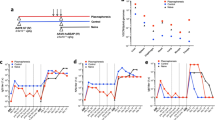Abstract
Development of neutralizing antibodies is an important hindrance that limits repeated administration of adenoviral vectors for gene transfer. One way to avoid this problem would be to coat the virus with a substance that could shield it from antibodies. To develop such a system, we coated negatively-charged adenovirus with the cationic lipid GL-67 and included polyethylene glycol (PEG) in the complex as dioleoylphosphatidylethanolamine-PEG (DOPE-PEG). This complex enhanced gene transfer to cells that were difficult to infect both in vitro and in vivo. GL-67/DOPE-PEG coated the virus and prevented anti- body binding. As a result, 50-fold higher concentrations of immune plasma were required for neutralization than with adenovirus alone. However, use of the complex provided no appreciable protection from neutralization when vector was delivered in vivo to immunized animals. These data are the first to suggest that formation of a complex around adenovirus can partially shield it from immune plasma in vitro. Despite the lack of protection in vivo, these results suggest the feasibility of developing a system in which the virus is effectively shielded from neutralizing antibodies and capable of repeat administration.
Similar content being viewed by others
Author information
Authors and Affiliations
Rights and permissions
About this article
Cite this article
Chillón, M., Lee, J., Fasbender, A. et al. Adenovirus complexed with polyethylene glycol and cationic lipid is shielded from neutralizing antibodies in vitro. Gene Ther 5, 995–1002 (1998). https://doi.org/10.1038/sj.gt.3300665
Received:
Accepted:
Published:
Issue Date:
DOI: https://doi.org/10.1038/sj.gt.3300665
- Springer Nature Limited
Keywords
This article is cited by
-
A cost-effective method to enhance adenoviral transduction of primary murine osteoblasts and bone marrow stromal cells
Bone Research (2016)
-
Current advances in developing cationic lipid-based nanoparticles as a vehicle for improving adenoviral gene delivery
Journal of Pharmaceutical Investigation (2016)
-
Systemically administered liposome-encapsulated Ad-PEDF potentiates the anti-cancer effects in mouse lung metastasis melanoma
Journal of Translational Medicine (2013)
-
Suppression of ovarian cancer growth via systemic administration with liposome-encapsulated adenovirus-encoding endostatin
Cancer Gene Therapy (2010)
-
Carrier Cell-based Delivery of an Oncolytic Virus Circumvents Antiviral Immunity
Molecular Therapy (2007)




